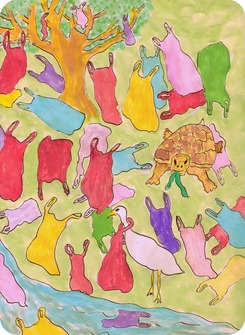
If you’re from New Jersey you may have read some of the articles or heard the news about the remarkable group of Girl Scouts from Teaneck who have been working for two years to ban single-use plastic bags in their town. They’ve researched the subject, shared what they’ve learned, and even hosted a summit with guest speakers to urge attendees to help spread the word that plastic bags are killing animals and destroying waterways and oceans. They want local businesses to help them reach the goal of becoming the first town in Bergen County to enforce the plastic bag ban.
Plastic bag recycling bins are a fixture in most grocery store entryways, and lots of Bergen County residents have the misguided notion that our local grocery stores are doing a good job of recycling plastic bags for us. It’s simply not true.
The most environmentally responsible thing to do, of course, is to bring your own reusable bags, but as cities all over the country begin to ban plastic bags, they are met with lots of resistance from the plastic bag manufacturers.
Almost two years ago, I tried to find out what actually happens to the bags we take to the supermarket for recycling for an article I was writing for the Suburbanite. Trying to get information from grocery stores was difficult, and several grocery stores refused to talk to me.
There is no doubt that plastic bags are causing an enormous amount of death and destruction, so it’s heartening to see Teaneck’s Girl Scouts working to have them banned.
SOME PLASTIC BAG FACTS:
Over 1 trillion plastic bags are used every year, globally - that amounts to about 2 million every minute.
According to the EPA, about 32 million tons of plastic waste is produced annually, much of it plastic bags.
According to the Natural Resources Defense Council, an average American family brings home 1,500 bags each year, and it takes about 12 million barrels of oil to produce them.
According to The Ocean Conservancy, plastic bags are consistently in the top 10 kinds of trash picked up on beaches everywhere.
Because plastic bags take so long to decompose, they wind up drifting on ocean currents for an unknown number of years, slowly breaking down into smaller and smaller pieces. These tiny bits of plastic wind up being eaten by fish and other animals who mistake the bits for food. When we eat these fish, we are eating the toxins from that ingested plastic. It’s way past time to ban plastic bags.
If you’re interested in my findings from two years ago, the article is archived, and here’s the link:
http://www.northjersey.com/news/environment/are-your-bags-being-recycled-1.1064015
Plastic bag recycling bins are a fixture in most grocery store entryways, and lots of Bergen County residents have the misguided notion that our local grocery stores are doing a good job of recycling plastic bags for us. It’s simply not true.
The most environmentally responsible thing to do, of course, is to bring your own reusable bags, but as cities all over the country begin to ban plastic bags, they are met with lots of resistance from the plastic bag manufacturers.
Almost two years ago, I tried to find out what actually happens to the bags we take to the supermarket for recycling for an article I was writing for the Suburbanite. Trying to get information from grocery stores was difficult, and several grocery stores refused to talk to me.
There is no doubt that plastic bags are causing an enormous amount of death and destruction, so it’s heartening to see Teaneck’s Girl Scouts working to have them banned.
SOME PLASTIC BAG FACTS:
Over 1 trillion plastic bags are used every year, globally - that amounts to about 2 million every minute.
According to the EPA, about 32 million tons of plastic waste is produced annually, much of it plastic bags.
According to the Natural Resources Defense Council, an average American family brings home 1,500 bags each year, and it takes about 12 million barrels of oil to produce them.
According to The Ocean Conservancy, plastic bags are consistently in the top 10 kinds of trash picked up on beaches everywhere.
Because plastic bags take so long to decompose, they wind up drifting on ocean currents for an unknown number of years, slowly breaking down into smaller and smaller pieces. These tiny bits of plastic wind up being eaten by fish and other animals who mistake the bits for food. When we eat these fish, we are eating the toxins from that ingested plastic. It’s way past time to ban plastic bags.
If you’re interested in my findings from two years ago, the article is archived, and here’s the link:
http://www.northjersey.com/news/environment/are-your-bags-being-recycled-1.1064015

 RSS Feed
RSS Feed
